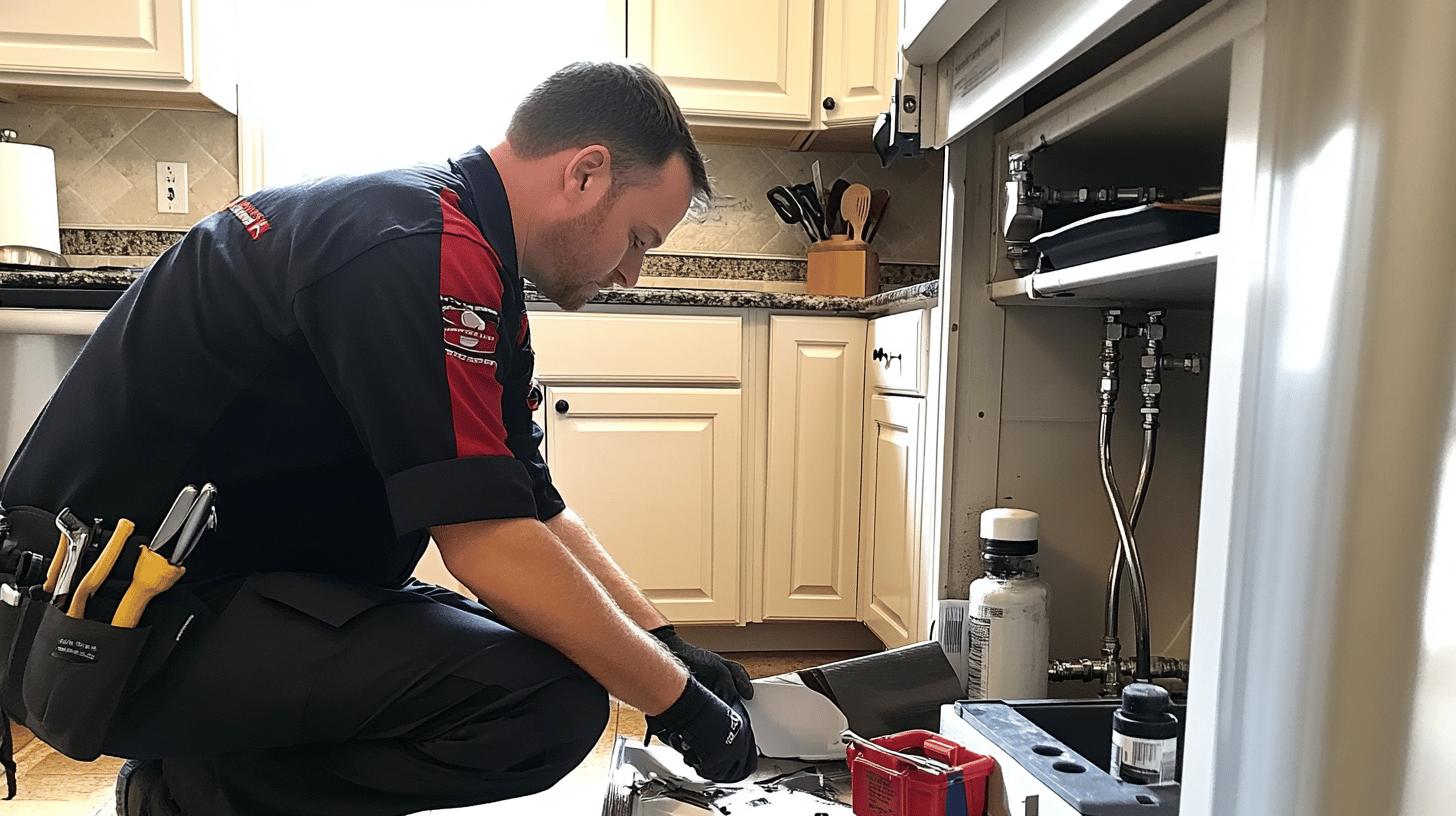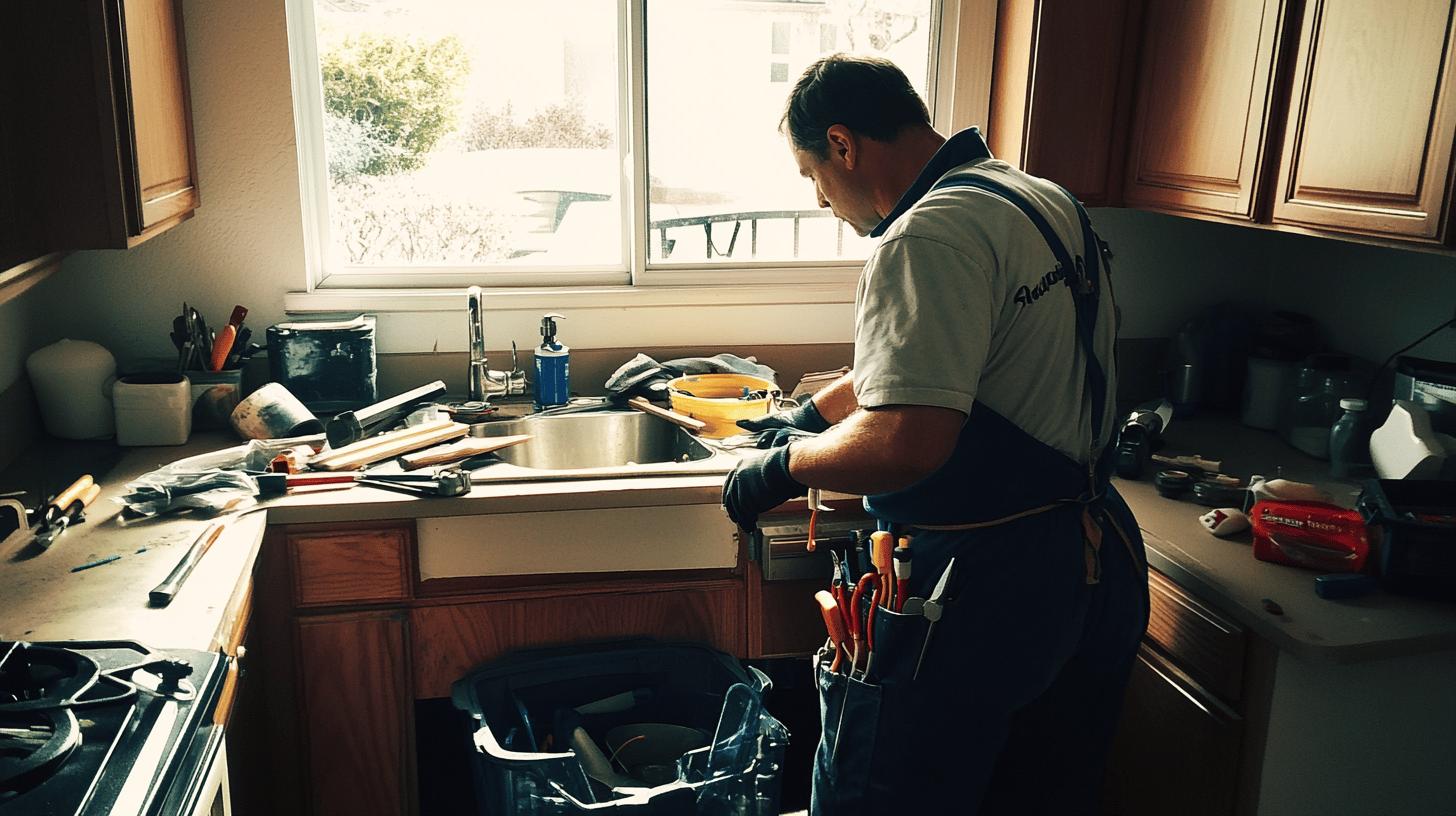TL;DR:
- Common causes of plumbing leaks: corrosion, poor sealing, high water pressure, chemical cleaners, and temperature changes.
- Regular maintenance tips: check water pressure, tighten fittings, inspect seals, clean drains, test shut-off valves, and look for moisture signs.
- Essential tools: pipe wrenches, sealants, leak detection devices, Teflon tape, and pipe cutters.
- Benefits of professional plumbing: precise leak detection, tailored advice, and reduced repair frequency.
- Innovative technologies: smart water sensors, automatic shut-off valves, remote monitoring systems, and advanced analytics for leak detection.
- Seasonal maintenance: insulate pipes in cold weather and clear gutters in warmer months to prevent leaks.
Are plumbing leaks unavoidable, or can you actually prevent them with some easy steps? Before you face water damage or expensive repairs, it’s important to know how to keep your plumbing system reliable. By understanding the common causes of leaks and sticking to regular maintenance tips, you can protect your home from plumbing problems. Check out our complete guide for practical strategies and tools to keep your plumbing in great shape and reduce the chances of unexpected leaks.
Understanding the Causes of Plumbing Leaks
Plumbing leaks usually stem from common issues like corrosion and poor sealing. Corrosion is a big problem, especially in older homes with galvanized steel or iron pipes. Over time, rust can weaken these pipes, causing leaks. Also, if pipe joints aren’t sealed properly, water can escape through those connections. Regular maintenance and inspections are super important because they help catch problems before they become serious.
- High water pressure: Too much pressure can break pipes and fittings.
- Chemical drain cleaners: Frequent use can erode pipes.
- Temperature changes: Quick temperature shifts can cause cracks by expanding and contracting pipes.
- Tree roots: Roots can invade and damage underground pipes.
- Poor installation: Incorrect installation creates weak points that leak.
Knowing the causes of plumbing leaks is essential for preventing them. When homeowners understand potential issues, they can take steps to maintain their plumbing systems. Regular inspections and following plumbing codes can help lower the risks. Conducting a thorough leak risk assessment can pinpoint areas that need attention. Tackling leaks quickly not only prevents more damage but also keeps the plumbing system running reliably.
Regular Maintenance Tips to Prevent Plumbing Leaks

Regular inspections are crucial for good plumbing maintenance. By checking your system frequently, you can catch small leaks before they become expensive issues. Start by examining visible pipes for signs of wear, like rust or drips. Make it a habit to check under sinks and around water heaters, since leaks often occur in these areas. Early detection can save you from water damage and help your plumbing last longer.
- Check water pressure: Keep it within a safe range to avoid straining pipes.
- Tighten fittings: Loose fittings can lead to leaks over time.
- Inspect seals: Look at seals around faucets and drains for wear.
- Clean drains regularly: This prevents clogs that cause pressure buildup.
- Test shut-off valves: Ensure they work for emergencies.
- Look for signs of moisture: Dampness or mold may indicate hidden leaks.
Professional plumbing inspections provide extra peace of mind. Skilled plumbers can identify issues that might get overlooked during regular checks. They have the tools to perform detailed assessments, including finding hidden leaks in walls or underground. Regular professional inspections help catch problems early, preventing them from turning into major, expensive repairs.
Seasonal maintenance is also important for preventing leaks. In colder months, insulating pipes can help avoid freezing and bursting. In warmer seasons, make sure to clear debris from gutters and downspouts to ensure proper drainage. Update your maintenance checklist for seasonal plumbing needs, and stay alert to changes to protect your home from potential plumbing issues.
Tools and Materials for Leak Prevention
Using high-quality plumbing materials is essential for creating a durable, leak-free system. Quality materials can handle wear and tear better, which reduces the chances of leaks. While cheaper materials may seem like a good deal, they often result in more frequent repairs and replacements. Investing in better materials not only extends the life of your plumbing system but also minimizes leak risks from corrosion or poor seals. Additionally, ensuring that joints are well-sealed is crucial, as they are common areas where leaks can occur.
- Pipe wrenches: Essential for tightening connections securely.
- Sealants: Ensure joints are properly sealed.
- Leak detection devices: Aid in early leak detection.
- Teflon tape: Effectively seals threaded pipe joints.
- Pipe cutters: Allow precise cuts, reducing gaps where leaks could occur.
These tools and materials are essential for keeping your plumbing system leak-free. Using them correctly can help prevent issues like loose fittings and poor seals, which are common causes of leaks. Leak detection devices can monitor your system and catch potential problems early on. By having these essentials on hand, you can effectively manage and prevent leaks, ensuring your plumbing remains reliable.
Professional Plumbing Services for Leak Prevention

Hiring professional plumbing services is a smart move for keeping your home leak-free. Why is this a good idea? Professionals can detect leaks accurately without causing much disruption. Experienced plumbers know how to find issues that might be hidden from you. Catching these problems early can save you from serious water damage and expensive repairs. Plus, they can give you personalized tips to help your plumbing system run efficiently.
- Check credentials: Ensure the plumber is licensed and certified.
- Read reviews: Feedback from past clients indicates reliability.
- Ask for estimates: Compare quotes for budget-friendly service.
- Verify insurance: Confirm insurance to protect against damages.
Investing in professional plumbing services pays off in the long run. Getting issues fixed right away can help your plumbing last longer and cut down on how often you need repairs. This not only gives you peace of mind but can also boost your property’s value. Plus, regular professional maintenance saves you money by preventing major plumbing problems. Working with trusted services keeps your plumbing system strong and leak-free, protecting your home.
Innovative Technologies for Leak Detection and Prevention
Smart leak detectors are changing the way we manage plumbing. These devices connect to smart home systems, so you can monitor your plumbing from anywhere. When they detect a leak, they send alerts to your phone, letting you take quick action to minimize water damage. You can install them in important spots like basements, under sinks, or near water heaters. Plus, with smart home integration, they can even automate responses, like shutting off the water supply if a leak happens, making your home safer and more efficient.
- Smart water sensors: Detect moisture and send alerts to smartphones.
- Automatic shut-off valves: Cut off water flow during a leak.
- Remote monitoring systems: Check plumbing status from anywhere.
- Advanced analytics: Provide insights into usage patterns and risks.
Staying updated with the latest plumbing technologies is key to preventing leaks. New innovations provide better protection and insight into your plumbing system. By using these tools, you can catch issues early and keep your plumbing in good shape. Embracing smart detectors and other tech helps protect your home and promotes sustainable water use. This proactive approach reduces surprises, keeping your home safe and giving you peace of mind.
Final Words
Knowing what causes plumbing leaks, like corrosion and poor sealing, is essential for prevention. Regular maintenance, including inspections and seasonal tasks, is key to keeping leaks away. Using high-quality materials and sealing techniques improves durability and lowers the chance of leaks in your plumbing.
Hiring professionals ensures your system gets a thorough inspection and repairs, giving you long-term peace of mind. Plus, innovative tech like smart leak detectors can help catch leaks early.
By following these strategies, you can maintain a leak-free home and keep your plumbing reliable and efficient.
FAQ
How to prevent plumbing leaks in the bathroom?
Regular inspections and maintenance can prevent leaks. Check for corrosion, ensure proper sealing, and keep drains clear. Installing water-efficient fixtures can also reduce pressure and minimize leak risks.
How to stop leakage of water from a pipe?
To stop water leakage from a pipe, tighten fittings and replace any worn seals. Using high-quality sealants can also help secure joints and prevent future leaks effectively.
How to prevent water leakage from walls?
Prevent leakage in walls by inspecting for potential plumbing issues, such as loose or corroded pipes. Use water-resistant materials and proper insulation to protect walls from water damage.
How to stop water leaking from pipe joints?
To stop leaks at pipe joints, apply sealant and tighten the joints. Regular checks for any signs of wear or corrosion are crucial for maintaining a tight seal.
Who to call for a water leak in the house?
For a water leak in the house, call a professional plumber. They can accurately diagnose, repair, and offer guidance on preventing future leaks in your plumbing system.
What is a common cause of a plumbing leak?
A common cause of plumbing leaks is corrosion, especially in older galvanized pipes. Other causes include high water pressure, improper sealing, and damage from chemical drain cleaners.

